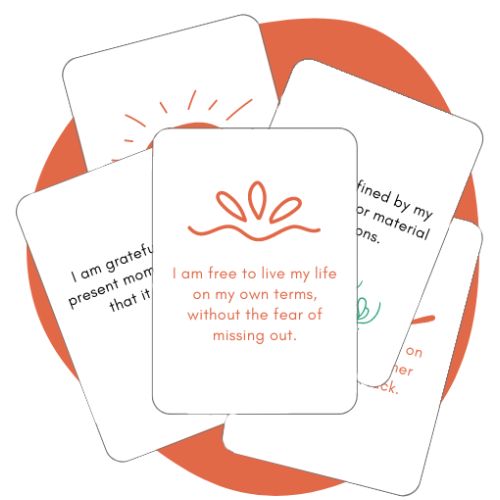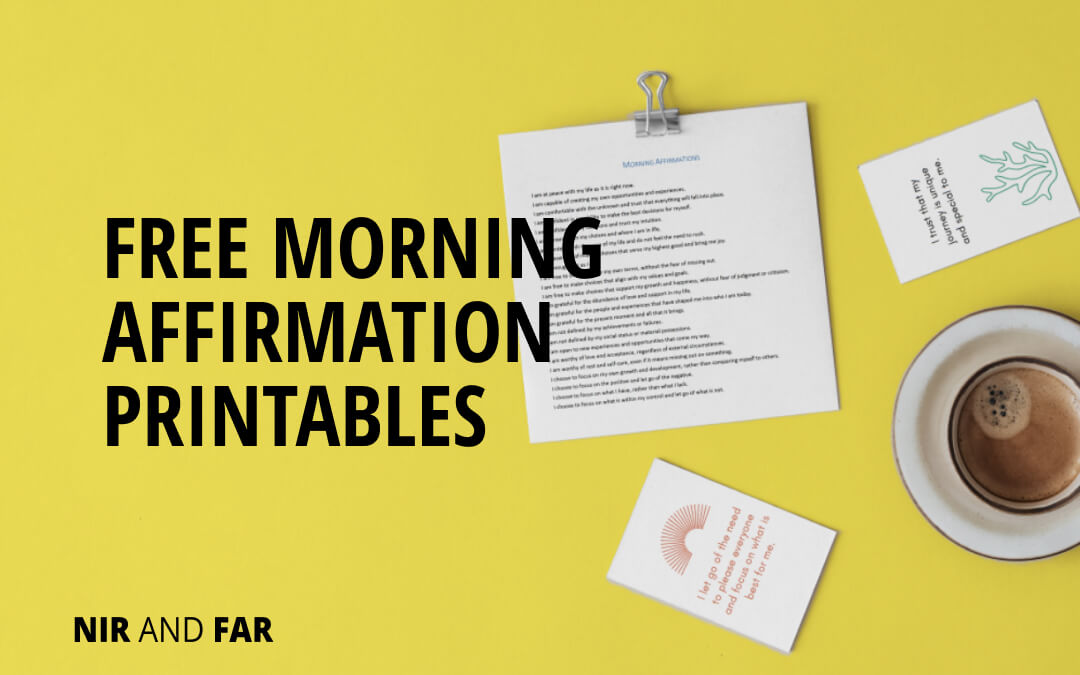Science shows self-affirmations can shift our mindset and behavior.
Even if you’re not sure about the power of morning affirmations, the science behind them is–when used correctly, self-affirmations can significantly affect your mindset and behavior. They have the power to rewire your brain, helping you break free from negative thought patterns and instill healthier habits.
In a 2015 study published in the journal Social Cognitive and Affective Neuroscience, researchers used MRI to observe brain function during self-affirmation tasks. They found that the brain’s ventromedial prefrontal cortex—a hub that connects the networks for emotional processing, decision-making, memory, self-perception, and social cognition—becomes more active when we process self-relevant information in a positive light, which affirmations encourage.
Another study, published in PLOS One in 2013, showed that affirmations can improve problem-solving abilities under stress. Participants who were asked to rank their values and write about why the top value was important to them (a form of self-affirmation) showed less of a stress response and performed better on a problem-solving task than those who didn’t self-affirm.
Plenty of other existing studies also suggest that morning affirmations can have a positive impact on our thoughts, emotions, and actions. We can use them to change our mindset and, as a result, our reality.
What Is Self-Affirmation?
Self-affirmation is an act that demonstrates one’s adequacy, according to the 2014 study “The Psychology of Change: Self-Affirmation and Social Psychological Intervention.”
Self-affirmation theory says that people have a “basic need to maintain the integrity of the self, a global sense of personal adequacy.” Threats to our self-integrity cause stress—one of many internal triggers, or negative feelings—and lead to “self-protective defenses,” like distraction, that inhibit performance and growth.
Self-affirmations help us handle these threats to our self-integrity by having us focus on our core values, or attributes of the people we want to be. Repeating affirmations “brings about a more expansive view of the self and its resources, weakening the implications of a threat for personal integrity,” according to the study.
Put simply, self-affirmations remind us of who we are and what’s important to us, giving us the perspective we need to conquer internal triggers. They help us to avoid being our own worst critics in difficult situations and instead encourage us to talk to ourselves the way we might talk to a friend.
Using self-affirmations, we can change the way we see ourselves to get rid of self-limiting beliefs. They help us become more self-compassionate and, therefore, more resilient.
Choosing the Best Morning Affirmations for You
The best morning affirmations will be different for every person. Your affirmations have to resonate with you, align with your goals, and inspire positive emotions. Think about what healthier habits you want to build and create affirmations that affirm these intentions.
Psychologist Lauren Alexander recommends that affirmations be “something positive about a certain quality or a good choice you’ve made, or just something affirming of your self-worth.” She also suggests finding an affirmation that acknowledges your discomfort but reinforces the skills you have to deal with it, like “This situation is difficult, but I have the skills and abilities to deal with it.”
David Creswell, a psychology professor at Carnegie Mellon University, told The Washington Post that effective affirmation “is more about really identifying, in really concrete ways, the kinds of things about you that you really value.”
To get you started, here are a few of the tried and true morning affirmations I created to help you maintain your integrity:
- I am at peace with my life as it is right now.
- I am capable of creating my own opportunities and experiences.
- I am comfortable with the unknown and trust that everything will fall into place.
- I am confident in my ability to make the best decisions for myself.
- I am confident in my decisions and trust my intuition.
- I am content with my choices and where I am in life.
Get the full list of morning affirmations, complete with illustrated cards for each:
Free Morning Affirmation Prompt Cards
Improve your mindset and build healthier habits.
Your email address is safe. I don't do the spam thing. Unsubscribe anytime. Privacy Policy.

How to Recite Your Morning Affirmations
Affirmations should either be spoken out loud or written down. Experts also suggest printing your daily affirmations on notecards to place around your environment. For morning affirmations, keep a list at bedside or by your toothbrush.
Some sources recommend repeating the affirmation ten times in each cycle, and others say to repeat them for five minutes.
When you recite affirmations is up to you. Recite them in the morning to start your day on a positive note. Recite them in the evening to relax after a long day. You might even recite affirmations two or three times a day. Bonus points if you say them in front of a mirror—neuroscience research shows that gazing at our reflections can help us develop a sense of self and even change our self-perception for the better if we pair it with positive affirmations.
Consistent affirmation practice is key to reaping the benefits. Repeating affirmations at the same time each day can help establish a routine and reinforce the new thought patterns you’re trying to instill. Research shows that regularly using affirmations when our self-integrity is threatened can improve education, health, and relationship outcomes for years to come.
To make sure that you never skip your affirmations, schedule them in a weekly calendar and record them in a habit tracker.
I also suggest using self-affirmations when internal triggers like doubt and fear cue you to seek relief in distraction. In those low moments, positive affirmations are a strong method for handling the bad feelings that stop you from doing what you want to do.
My advice for writers and authors, for example, is to find an affirmation that helps them to curb the boredom, self-loathing, and self-doubt they are bound to experience during the writing process. A person who keeps deleting everything they write, thinking it will never be as good as what others have written, might choose “I release the need to compare myself to others.”
How Not to Use Positive Affirmations
- Generic Phrasing: Creswell said to avoid broad, general affirmations. They have to “align with what you believe about yourself,” Natalie Dattilo, a clinical psychologist with Brigham and Women’s Hospital in Boston, told the WaPo.
- Inconsistency: To effectively rewire your brain, you have to consistently repeat affirmations. Try using timeboxing to schedule five minutes for self-affirmation practice.
- Negative Phrasing: Instead of saying “I am not lazy,” say “I am proactive and energetic.” The point of positive affirmations is to get rid of negative thoughts—so they should focus on positive language.
- Toxic Positivity: Alexander says to avoid using positive affirmations as a way to deny the hardship you’re experiencing. Claiming “I am awesome” when you’re struggling with feelings of self-dislike may create cognitive dissonance and lead to frustration. Instead, choose affirmations that resonate with your current situation and align with your realistic goals, such as “I am becoming more accepting of who I am every day.”
- Expecting Miracles: Affirmations won’t make your problems disappear. Use them to turn your mindset into an asset, not as a replacement for traction, aka an action that moves us toward what we really want.
As the science says, morning affirmations can reshape your mindset, boost your self-esteem, and foster healthier habits. Try a routine of self-affirmation to see if it helps you release the harmful self-perceptions that are holding you back.
If you were surprised by the science behind affirmations, you might also be surprised by the science of “manifestation.”
Related Articles
- Schedule Maker: a Google Sheet to Plan Your Week
- Habit Tracker Template in Google Sheets
- The Ultimate Core Values List: Your Guide to Personal Growth
- Timeboxing: Why It Works and How to Get Started in 2025
- An Illustrated Guide to the 4 Types of Liars
- Hyperbolic Discounting: Why You Make Terrible Life Choices
- Happiness Hack: This One Ritual Made Me Much Happier

